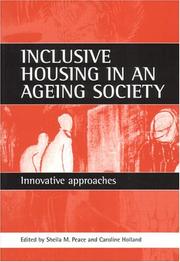| Listing 1 - 10 of 13 | << page >> |
Sort by
|
Book
ISBN: 1558443819 1558443304 9781558443815 9781558443303 Year: 2015 Publisher: Cambridge, MA
Abstract | Keywords | Export | Availability | Bookmark
 Loading...
Loading...Choose an application
- Reference Manager
- EndNote
- RefWorks (Direct export to RefWorks)
This report illustrates how local governments can realize the full benefit of inclusionaryhousing policies, which require developers of new market-rate real estate to providesome affordable units for lower-income residents. Policy makers, practitioners, and localleaders will learn how to build public support, use data to inform program design,establish reasonable expectations for developers, and ensure long-term program quality.
Inclusionary housing programs --- Low-income housing --- Mixed-income housing --- Housing --- Housing programs, Inclusionary --- Housing policy --- Zoning
Book
Year: 2003 Publisher: [Washington, D.C.] : U.S. Department of Housing and Urban Development, Community Planning and Development,
Abstract | Keywords | Export | Availability | Bookmark
 Loading...
Loading...Choose an application
- Reference Manager
- EndNote
- RefWorks (Direct export to RefWorks)
Inclusionary housing programs --- Public housing --- Federal aid to housing --- Mixed-income housing --- Housing policy --- Finance.
Book
ISBN: 9781837538157 Year: 2024 Publisher: Leeds : Emerald Publishing Limited,
Abstract | Keywords | Export | Availability | Bookmark
 Loading...
Loading...Choose an application
- Reference Manager
- EndNote
- RefWorks (Direct export to RefWorks)
Nearly 1.6 billion people worldwide are living in inadequate conditions, according to a recent United Nations report. Local authorities are running out of ways to tackle the increasing challenges of affordable housing. In South Africa, this issue is compounded by historical apartheid and spatial segregation. However, mixed-income housing has proven an effective strategy for alleviating the concentrated poverty that marginalizes certain communities. Functioning as a toolkit for inclusive urban planning, Mixed-Income Housing Development Planning Strategies and Frameworks in the Global South evaluates how this framework meets specific socio-economic goals as opposed taking a broad overview of development. Exploring the relevant policies, planning, and legislation that have guided human settlements in South Africa, the authors consider how best to combat residential segregation, informal settlements, and the exclusive allocation of public housing units to the poorest of the poor. Additional case studies from the USA, Australia, Netherlands, Brazil, Nigeria, Botswana, and Ghana compare emerging building strategies and their benefits, including spatial integration, improved access to social services and other infrastructure, and the promotion of local economic development (LED). Mixed-income housing development has been described as the only way to confront increasing urban poverty and segregation in our built environment. Analysing past projects and focusing on future trends and trajectories, this book acts as both a model for understanding the planning and management of this framework, and a foundation for future research.
Mixed-income housing --- Housing development --- Mixité sociale dans le logement --- Promotion résidentielle
Book
Year: 2013 Publisher: Washington, DC : U.S. Department of Housing and Urban Development, Office of Policy Development and Research,
Abstract | Keywords | Export | Availability | Bookmark
 Loading...
Loading...Choose an application
- Reference Manager
- EndNote
- RefWorks (Direct export to RefWorks)
Book
Year: 2015 Publisher: [Washington, D.C.] : U.S. Department of Housing and Urban Development, Office of Policy Development and Research,
Abstract | Keywords | Export | Availability | Bookmark
 Loading...
Loading...Choose an application
- Reference Manager
- EndNote
- RefWorks (Direct export to RefWorks)
Book
Year: 2013 Publisher: Washington : U.S. Government Printing Office,
Abstract | Keywords | Export | Availability | Bookmark
 Loading...
Loading...Choose an application
- Reference Manager
- EndNote
- RefWorks (Direct export to RefWorks)
Public housing --- Mixed-income housing --- Housing subsidies --- Federal aid to housing --- Federal aid to community development --- Finance. --- Choice Neighborhoods (Program)

ISBN: 1315242567 1138258261 0754619109 1351898434 9781351898430 9781315242569 9780754619109 9781351898416 9781138258266 1351898426 Year: 2016 Publisher: Milton Park, Abingdon, Oxon New York, NY
Abstract | Keywords | Export | Availability | Bookmark
 Loading...
Loading...Choose an application
- Reference Manager
- EndNote
- RefWorks (Direct export to RefWorks)
Urban renewal --- Slums --- Housing policy --- Inclusionary housing programs --- Citizen participation. --- Housing programs, Inclusionary --- Housing --- Housing and state --- State and housing --- Slum clearance --- Model cities --- Renewal, Urban --- Urban redevelopment --- Urban renewal projects --- Government policy --- Low-income housing --- Mixed-income housing --- Zoning --- City planning --- Social policy --- Land use, Urban --- Urban policy --- Citizen participation --- E-books
Book
ISBN: 022630390X 022647819X 9780226478197 9780226303901 9780226164397 022616439X Year: 2015 Publisher: Chicago, Ill.: University of Chicago press,
Abstract | Keywords | Export | Availability | Bookmark
 Loading...
Loading...Choose an application
- Reference Manager
- EndNote
- RefWorks (Direct export to RefWorks)
For many years Chicago's looming large-scale housing projects defined the city, and their demolition and redevelopment-via the Chicago Housing Authority's Plan for Transformation-has been perhaps the most startling change in the city's urban landscape in the last twenty years. The Plan, which reflects a broader policy effort to remake public housing in cities across the country, seeks to deconcentrate poverty by transforming high-poverty public housing complexes into mixed-income developments and thereby integrating once-isolated public housing residents into the social and economic fabric of the city. But is the Plan an ambitious example of urban regeneration or a not-so-veiled effort at gentrification? In the most thorough examination of mixed-income public housing redevelopment to date, Robert J. Chaskin and Mark L. Joseph draw on five years of field research, in-depth interviews, and volumes of data to demonstrate that while considerable progress has been made in transforming the complexes physically, the integrationist goals of the policy have not been met. They provide a highly textured investigation into what it takes to design, finance, build, and populate a mixed-income development, and they illuminate the many challenges and limitations of the policy as a solution to urban poverty. Timely and relevant, Chaskin and Joseph's findings raise concerns about the increased privatization of housing for the poor while providing a wide range of recommendations for a better way forward.
Mixed-income housing - Illinois - Chicago --- Inclusionary housing programs - Illinois - Chicago --- Community development - Illinois - Chicago --- Social integration - Illinois - Chicago --- Logement à revenu mixte --- Programme de logement inclusif --- Développement communautaire urbain --- Intégration sociale --- Illinois --- Chicago --- Mixed-income housing --- Inclusionary housing programs --- Community development --- Social integration --- Chicago Housing Authority. --- Inclusion, Social --- Integration, Social --- Social inclusion --- Sociology --- Belonging (Social psychology) --- Regional development --- Economic assistance, Domestic --- Social planning --- Housing programs, Inclusionary --- Housing policy --- Low-income housing --- Zoning --- Housing --- Citizen participation --- Government policy --- public housing, mixed income neighborhoods, inner city, cities, urban areas, social services, chicago, illinois, united states of america, american culture, usa, redevelopment, poverty, gentrification, privatization, inclusionary, transformation plan, community development, interactions, engagement, surveillance, civic life, integration, regulation, policy orientations.
Book
ISBN: 9781479840373 1479840378 9781479812462 1479812463 9781479818631 1479818631 Year: 2016 Publisher: New York, NY
Abstract | Keywords | Export | Availability | Bookmark
 Loading...
Loading...Choose an application
- Reference Manager
- EndNote
- RefWorks (Direct export to RefWorks)
On an average morning in the tree-lined parks, plazas, and play-areas of Manhattan's Stuyvesant Town housing development, birds chirp as early risers dash off to work, elderly residents enjoy a peaceful morning stroll, and flocks of parents usher their children to school. It seems an unlikely location for conflict and strife, yet this eighteen-block area, initially planned as middle-class affordable housing, is the site of an ongoing struggle between long-term, rent-regulated residents, younger, market-rate tenants, and new owners seeking to turn this community into a luxury commodity. 'Priced Out' takes readers into this heated battle as a transitioning neighborhood wrestles with contemporary capitalist strategies and the struggle to preserve renters' rights.
Middle class --- Neighborhoods --- Housing development --- Mixed-income housing --- Rent control --- Housing --- Development, Housing --- Residential development --- Residential subdivisions --- Real estate development --- Inclusionary housing programs --- Rent regulation --- Rent restrictions --- Landlord and tenant --- Price regulation --- Affordable housing --- Homes --- Houses --- Housing needs --- Residences --- Slum clearance --- Urban housing --- City planning --- Dwellings --- Human settlements --- Neighborhood --- Neighbourhoods --- Communities --- Bourgeoisie --- Commons (Social order) --- Middle classes --- Social classes --- Law and legislation --- Social aspects --- Social conditions --- E-books

ISBN: 1447302583 9786612318559 1282318551 1847425364 1861342632 1861343450 Year: 2001 Publisher: Bristol : Policy Press,
Abstract | Keywords | Export | Availability | Bookmark
 Loading...
Loading...Choose an application
- Reference Manager
- EndNote
- RefWorks (Direct export to RefWorks)
This book is the first to bring together people from the worlds of architecture, social science and housing studies to look at the future of living environments for an ageing society. It uniquely moves beyond the issues of accommodation and care to look at the wider picture of how housing can reflect the social inclusion of people as they age.
Older people --- Inclusionary housing programs. --- POLITICAL SCIENCE --- BUSINESS & ECONOMICS --- SOCIAL SCIENCE --- Inclusionary housing programs --- Housing. --- Public Policy --- City Planning & Urban Development. --- Infrastructure. --- General. --- Housing --- Great Britain. --- Housing programs, Inclusionary --- Housing policy --- Low-income housing --- Mixed-income housing --- Zoning --- Behavioral sciences --- Human sciences --- Sciences, Social --- Social science --- Social studies --- Civilization --- Business economics --- Economics --- Industrial management --- Management --- Microeconomics --- Administration --- Civil government --- Commonwealth, The --- Government --- Political theory --- Political thought --- Politics --- Science, Political --- Social sciences --- State, The --- Housing for the elderly --- Senior housing
| Listing 1 - 10 of 13 | << page >> |
Sort by
|

 Search
Search Feedback
Feedback About UniCat
About UniCat  Help
Help News
News